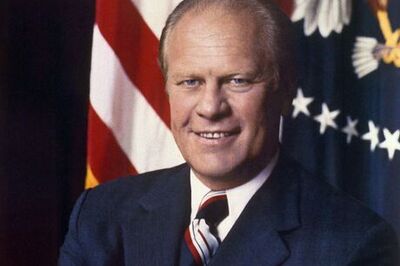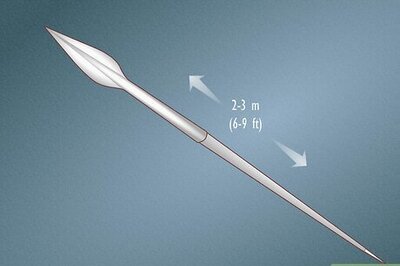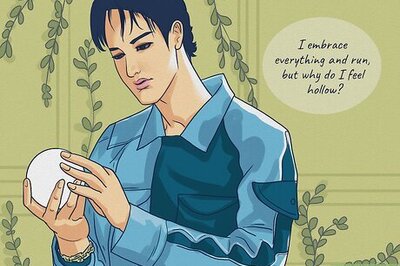
views
New Delhi: Five years after receiving the official nod, former Supreme Court judge and current member of the National Human Rights Commission (NHRC) Pinaki Chandra Ghose has become India’s first anti-corruption ombudsman, or Lokpal, after his name was cleared and recommended by the high-level selection committee chaired by Prime Minister Narendra Modi.
It was in 2013 that the Lokpal Act was passed after a nationwide anti-corruption movement, burgeoning demands for setting up of Lokpal at the Centre and Lokayuktas in the states to probe corruption complaints against top functionaries and public servants, including the Prime Minister and the chief ministers.
One of the verdicts for which Justice Ghose will be remembered was related to the prosecution of former Tamil Nadu chief minister J Jayalalithaa and her aide VK Sasikala. In February 2017, the division bench of Justice Ghose and Justice Amitava Roy found Jayalalithaa and Sasikala guilty of misusing public office to launder ill-gotten wealth for purchasing huge properties in the name of masked fronts.
Considering Justice Ghose’s verdict in the disproportionate assets case, as it came to be known, his role now as the Lokpal assumes more significance since the jurisdiction of the Lokpal also brings the Prime Minister under its purview, provided a full bench of the Lokpal and at least two-thirds of members approve an inquiry.
However, it does not allow a Lokpal inquiry if the allegation against the Prime Minister relates to international relations, external and internal security, public order, atomic energy and space. Such an inquiry against the Prime Minister (if conducted) is to be held in-camera and if the Lokpal comes to the conclusion that the complaint deserves to be dismissed, the records of the inquiry are not to be published or made available to anyone.
It was also Justice Ghose who was part of a bench that had breathed a new lease of life in the Ram Janmabhoomi-Babri Masjid title demolition criminal suit.
Delivering a significant verdict with massive political ramifications, the Supreme Court bench of Justice Ghose and Justice Rohinton Fali Nariman had restored criminal conspiracy charges against senior BJP leaders LK Advani, Union minister Uma Bharti, Murli Manohar Joshi and 13 other leaders in the 1992 Babri Masjid demolition case.
Invoking its extraordinary constitutional powers under Article 142 of the Constitution, the bench also transferred the pending separate trial in a Rae Bareilly Magistrate court and clubbed it with criminal proceedings in the Lucknow CBI Court. This was seen as an effort to expedite a criminal trial which remained pending for many years.
Justice Ghose is the son of late Justice Sambhu Chandra Ghose, former Chief Justice of Calcutta High Court. He is a fifth-generation lawyer in the family of Dewan Baranasi Ghose of Jorasanko, a renowned family from the Northern provinces of the City of Calcutta. Hara Chandra Ghose, who became the first Indian Chief Judge of the Sadar Dewani Adalat at Calcutta in 1867, was a member of this family
Born on May 28, 1952, Ghose obtained his law degree from University of Calcutta and was enrolled as an advocate on November 30, 1976. He practised in civil, commercial, constitutional and company matters in Calcutta high court and was appointed a permanent judge of the Calcutta high court on July 17, 1997.
Justice Ghose is also known to be intolerant towards visible acts of contempt of court and indeed holds the “majesty of court" in high regard. In an unprecedented act, a then CJI Justice JS Khehar-led bench of which Justice Ghose was a part, had sentenced Calcutta High Court judge CS Karnan to six months in jail for contempt of court.
When the CJI said, “in contempt we do not distinguish. There is no colour...sitting or non-sitting. If he thought we will not punish him as he is sitting, he is wrong," Justice P C Ghose had also intervened to say that the court was only seeing him as a "citizen of India" and the rule is same for all citizens.
Justice Ghose was also a part of the revolutionary verdict that barred photos of politicians in government advertisements. A Supreme Court bench comprising Justice Ranjan Gogoi and Justice PC Ghose had restrained ruling parties from publishing photographs of political leaders or prominent persons in government-funded advertisements.
Justice Ghose has also held the post of executive chairman, West Bengal State Legal Services Authority and also Andaman & Nicobar State Legal Services Authority in 2007. He was later nominated as member of the Central Authority of National Legal Services Authority on November 6, 2011.




















Comments
0 comment